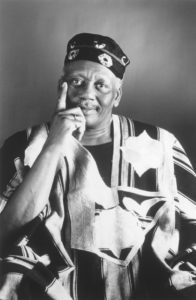
Dr. Randy Weston
Randy Weston, born in Brooklyn, New York in 1926, didn’t have to travel far to hear the early jazz giants that were to influence him. Though Weston cites Count Basie, Nat King Cole, Art Tatum, and of course, Duke Ellington as his other piano heroes, it was Monk who had the greatest impact. “He was the most original I ever heard,” Weston remembers. “He played like they must have played in Egypt 5000 years ago.”
Randy Weston’s first recording as a leader came in 1954 on Riverside Records Randy Weston plays Cole Porter – Cole Porter in a modern mood It was in the 50’s when Randy Weston played around New York with Cecil Payne and Kenny Dorham that he wrote many of his best loved tunes, “Saucer Eyes,” “Pam’s Waltz,” “Little Niles,” and, “Hi-Fly.” His greatest hit, “Hi-Fly,” Weston (who is 6′ 8″) says, is a “tale of being my height and looking down at the ground.”
Randy Weston has never failed to make the connections between African and American music. His dedication is due in large part to his father, Frank Edward Weston, who told his son that he was, “an African born in America.” “He told me I had to learn about myself and about him and about my grandparents,” Weston said in an interview, “and the only way to do it was I’d have to go back to the motherland one day.”
n the late 60’s, Weston left the country. But instead of moving to Europe like so many of his contemporaries, Weston went to Africa. Though he settled in Morocco, he traveled throughout the continent tasting the musical fruits of other nations. One of his most memorable experiences was the 1977 Nigerian festival, which drew artists from 60 cultures. “At the end,” Weston says, “we all realized that our music was different but the same, because if you take out the African elements of bossa nova, samba, jazz, blues, you have nothing……….
To me, it’s Mother Africa’s way of surviving in the new world.”
For photographs, discography, and more information, go to www.randyweston.info
Photo: Cheung Ching Ming
Categories: Healing, Music, Retreats, Storytelling
